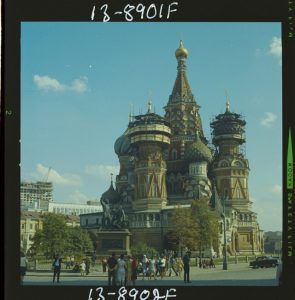by Jeffrey Meyers
I was a young English woman, well educated, innocent and unworldly, but spirited and in search of adventure for which I was not prepared. My aunt Constance Garnett, who translated Leo Tolstoy’s novels, had just returned from a visit to Yasnaya Polyana, the estate of the great man, 130 miles south of Moscow. She wrote that he was looking for a governess for his young children and thought I was well qualified to teach them. I applied with her recommendation and secured the position.
I could sail either from Southampton through the Mediterranean to Odessa on the Black Sea or from Newcastle through the Baltic to Saint Petersburg. Though the southern route was more exotic, I disliked hot weather—thus my attraction to Russia. Eager to reach my destination, I chose the more expeditious northern route.
A gentleman, who claimed to have a title and stamped a coronet on his luggage, attentively settled me on the deck with a lounge chair and rug. After two dinners together he suggested a more intimate tête-à-tête in his luxurious cabin. I refused with a frosty firmness and he wandered off to easier prey. One bold cad banged on my door after I’d retired to bed. Fortunately, the steel was secure and I slept safely.
I was put into a droshky from the Russian port to the Finland Station. The long open Petersburg-Moscow train compartment was packed with people. Wrapped in furs and huddled together against the cold, they passed around vodka, swilled it straight from the bottle and sometimes collapsed onto the floor. In the corner one man took liberties with the private parts of a drunken woman. I kept myself to myself. When my foreign appearance attracted attention, I uttered nyet Russkie and was left alone.
I had to change trains in Moscow for the trip south to Tula, the provincial town about ten miles from Tolstoy’s estate. I’d left England in the mild autumn, but winter came early to Russia. Darkness fell suddenly, snowdrifts obscured the road and the horse-drawn sleigh, lit by one lantern, seemed lost in the swirling storm. We were pursued by howling wolves whose eyes reflected the moonlight. I thought of the steppes, Siberia and the knout of Holy Russia.
Everyone was in bed when I arrived in the middle of the night. A doddering servant led me to my austere room, which had a thin mattress on an iron frame, a bureau, water jug, basin, chamber pot and bare wooden floor. I was exhausted and immediately fell into a deep sleep.
I had been expecting a palatial estate. When I woke the next morning amid the household din, I discovered that Yasnaya Polyana (Bright Glade) was nothing more than a two-storey white building, dilapidated and decayed. Set in a hilly countryside, it was next to a birch forest and a grim, thatched-roof peasant village. The Spartan house had no soft furniture, only hard chairs, and was lit by stinking tallow candles. The family bedrooms were icy and bleak, without carpets, bed linen or pillow cases.
The next day I met and was horrified by the great writer, who immediately fell off his pedestal. Slovenly and smelly, monstrous and frightening, he had a repulsive face and awkward body, thick flat nose, large protruding ears and strands of greasy hair. The count wore a coarse peasant blouse bound with a thick belt, high black boots and sheepskin coat. He spoke correct but heavily accented English, squishing his letters together and leaving out (as in Russian) the definite and indefinite articles. Tolstoy rarely spoke about his novels, but seemed pleased that I had the same first name as Anna Karenina. He later explained that his Anna couldn’t bear to spend the rest of her life with the icy Karenin and was even willing to sacrifice her beloved son in order to run away with the dashing Vronsky.
Tolstoy had given up servants. He cleaned his own room, lit stoves, cut wood, carried water, made ill-fitting footgear and forced his fashionable older daughters to hobble about in them. Soon after we met he assumed a confessional mood and insisted on telling me that he’d spent his youth whoring with gipsy and Cossack girls, and had even been infected with venereal disease (though I didn’t quite know what that was). I was shocked and horrified by his revelations of sexual debauchery. When he saw I was upset, he advised me to “go for a walk, wear a corset and be with Christ.”
Tolstoy’s wife Sofya, glad to have me relieve her of the unbearable burden of her children, treated me with proper politeness. She even, in time, confided in me about her innocent though provocative flirtation with the handsome young violinist. He accompanied her when she played the piano and aroused Tolstoy’s violent jealousy. Sofya became, during my tenure, increasingly suspicious, hysterical and pitiful. In times of stress, she’d make futile suicide attempts and throw herself into the pond. Fortunately, it was shallow and she always survived. She quarreled constantly with Tolstoy and he hated her.
The manor had strange, even barbaric Russian customs. After steaming in the bathhouse, the victims were beaten with birch rods and rolled in the freezing snow. One of the peasant children—it may have been Sasha, Masha, Pasha or Natasha—borrowed skates, wobbled on the ice, fell through a fishing hole and disappeared forever. The Tolstoys kept a miserable bear confined in a narrow cage. One day, for a jest, the keeper let him out and tied him to the back of a sturdy former serf. The bear promptly killed and ate him! Though the family loved grilled bear steak, they refused to eat the bear that ate the old serf.
Weirdest of all were the servants, and the filthy, squalid and drunken peasants. The servants slept on top of the huge pot-bellied porcelain stoves, and when it was cold two or even three piled on top of each other. Prematurely aged by an obscure skin disease, young Grigory looked older than old Grigory. He carelessly let the samovar boil over and ruined the dining room table. The house servants toiled well in the fields, the field servants worked well in the house, but Tolstoy refused to exchange them. Both excelled compared to the toothless village idiot, who muttered holy phrases and was mocked by the gentry and peasants.
The Orthodox Easter church service was conducted beneath the golden onion-shaped dome and below the frescoes of the Byzantine saints and the mournful face of Christ. The long-bearded priests wore high, flat-topped, brimless hats. Their theatrical performance included candles, bells, incense, chanting, processions, brocaded vestments and kissing the wonder-working icons. I found all this, compared to the calm simplicity of Anglican Evensong, excessive and garish.
Ragged, starving beggars in greasy sheepskin coats and muddy felt boots begged for scraps of food at the windows of the manor. Even crazier than the extreme Old Believers and more orthodox than the Orthodox, were the Doukhobors (Spirit Wrestlers). They practiced shocking nudity and arson as visible protests against compulsory military service.
This was the strange, distressing world that I—a fair-haired girl of nineteen, pleasantly plump and with a well developed figure—entered as governess. Apart from my Aunt Constance, I liked to point out my only previous connection to Russia. As the daughter of the head gardener at Windsor Castle, I occasionally caught sight of Queen Victoria herself, grandmother of the czar’s wife.
Countess Tolstoy gave birth to an incredible thirteen children between 1863 and 1888, of whom three died infancy and two in childhood. Their illnesses and deaths caused perennial anxiety and grief. The surviving children were not brought up by their parents, but by a small army of wet and dry nurses, nannies, maids, body servants, governesses and tutors.
I was imported to teach the children English and to read Dickens and other great novelists in my native tongue. Since I knew no Russian, we communicated at first with gestures, caresses, smiles and even tears. I taught the English alphabet with large letters carved and painted on wooden blocks. They would sit on my lap or next to me, look at picture books and match the proper words to animals, flowers and household items. After that we began simple conversations about subjects that interested them: clothing, pets, walks, treats and holidays. I made up games and wrote poems, and we sang hymns like William Blake’s “Jerusalem”: “And did those feet in ancient times / Walk upon England’s mountains green.” I always wept when I remembered my distant country. We read Little Women, Little Lord Fauntleroy and other little books as well as the Illustrated London News that glorified (behind the count’s back) the British Empire. To refine my pupils’ taste, I ordered Pears soap and Golden Syrup from the English Store on Nevsky Prospekt in Petersburg.
I took them outside, even in the coldest winters, and bathed them every night. When they were spoiled or behaved badly, I taught them common sense and proper manners. I developed their charitable principles by leading them to the peasant huts with gifts of food and cast-off garments. The countess was constantly occupied with her latest infant and with making clear copies for the printer of Tolstoy’s almost illegible handwriting. Since Tolstoy was curiously undemonstrative, unable to touch or kiss his children, I tried to supply the affection they all lacked and craved.
But all was not smooth sailing. The girls became deeply attached to me. But Ilya, the oldest lad in my charge and big for his age, was unruly and violent. Anti-intellectual, he disliked poetry, music, languages, studies—and me! He pulled the girls’ pigtails, went in for practical jokes with ink and gum, shouts and obscenities, and threatened my uneasy position in the household. If I could not control him and give satisfaction, I might be dismissed. Knowing no one and so far from home, I’d have nowhere to go.
Tolstoy, after a long struggle, had given up alcohol, tobacco and meat. But the reformed rake who preached chastity could not give up sex and continued to have carnal relations into old age. The local gentry remarked that he plowed the peasants and harvested the bastards. His offspring, Tanya and Vanya, served as maid and coachman in the household, and as painful reminders to Sofya of his lurid past. Tolstoy rubbed against me when we played Chopin duets on the piano and constantly tried to seduce me. So I had to remain alert and make certain that I was never alone with him.
Wavering between gross bullying and offensive comments, St. Leo the great genius turned into a brutal beast. One unsuspecting day he sent the servants away and burst into my room while his children played upstairs in the nursery and Sofya continued the eternal copying of his work. When I told him to leave and reminded him of his solemn oath, he cynically replied,
–Taking a vow of chastity is not the same as being chaste. Everyone submits, you resist. –I’m not being coy. You repel me.
–The greater the obstacles (he said), the greater the pleasure when they are overcome.
I pleaded with him in my best Russian:
—Ya vas proshu, manya ostavit! (I beg you to leave me!)
–Wouldn’t you be honored to bear my child?
–I’d rather be dead than have a bastard with you.
Practiced and deliberate, Tolstoy—revered for his saintly character throughout the world—took out his male member that looked like a piece of old rope: thick, twisted and nasty. He tore open the top of my dress, grabbed my breasts and bit my tender nipples. I tried to scream, to cry for help, but he silenced me by banging my head on the floor and pushing a wet cloth into my mouth so I could scarcely breathe.
He was not in the least deterred by the urine that poured out of me and soiled my garments. Pressing his fingers around my throat and nearly choking me to death, he forced me to open my legs and shoved his hot ramrod into my bruised and torn flesh. During this depravity he continued to utter insulting endearments and call me his plump partridge. He seemed to split me into two parts, the pain was intense and I couldn’t stop bleeding.
–I want your forgiveness.
–You have my undying hatred.
–You can’t hate me more than I hate myself.
–I certainly can. You want to improve the world and banish copulation. But you’ve ruined my life to achieve momentary pleasure.
He handed me a whip, got down on his knees and, playing the penitential role, begged me to beat him. I refused to give him that final satisfaction. I felt guilty and ashamed, even though it wasn’t my fault. Afterwards, I had to pretend, despite his lecherous stares, that nothing had happened. If the countess found out that he’d raped me, she would immediately cast me out.
I feared pregnancy, became ill, lost weight and was determined to escape. The flirtatious German tutor, Thomas Kröger, was sympathetic and helpful. I became acquainted with him on our walks and discussions about the children. He loved the marzipan sent from his handsome hometown, Lübeck, and I was delighted when he gave me some at Christmas time. He assured me that he could take up his old teaching post in the Gymnasium. Formal and well mannered, he liked me and I trusted him. We had very few expenses and managed to save almost all of our salaries. I would miss the children (except Ilya) and was sorry that I could not bid them a tearful farewell. We secretly packed our bags, bribed the coachman and stole off like thieves in the night. Breathless, we just caught the 6 A.M. train from Tula to Moscow. I promised to marry Thomas and hope to God he’ll leave me alone.
Jeffrey Meyers, FRSL, has had 33 of his 54 books translated into fourteen languages and seven alphabets, and published on six continents. He’s recently published Thomas Mann’s Artist-Heroes (2014), Robert Lowell in Love (2015) and Resurrections: Authors, Heroes—and a Spy (2018).





Be First to Comment